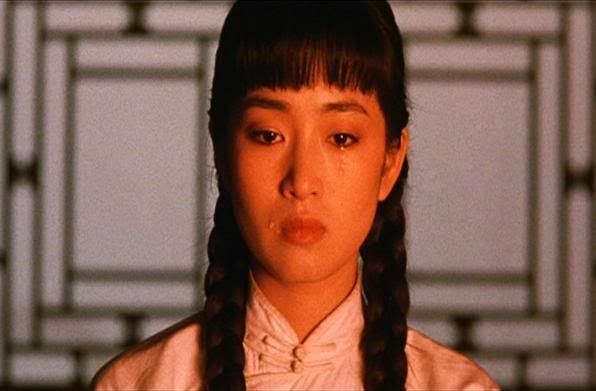 Raise the Red Lantern
Raise the Red Lantern is surely one of the finest films of its decade? It’s visually spellbinding, as expected, but unlike Yimou’s recent efforts
Lantern’s style is less to do with our being blitzed with special effects and more to do with the director’s ability to exploit his setting’s potential to the max. Almost the entire film takes place in a palatial complex of enormous proportions. When we first arrive here along with our protagonist, Songlian, it’s difficult not to be overawed by the extravagance of a residence that apparently branches out in all directions. Nevertheless, it’s the banality of this sparsely-inhabited space that emerges as it’s most resounding feature, and the narrative’s direction ensures that what first seems magnificent later morphs into little more than a stifling human compound. The greys and browns that dominate the palette of Yimou’s exteriors contribute to this nullifying effect, forming a brazen contrast to the copious use of reds that paint internal space. That colour’s primary connotation here is a sexual one: the lighting of the red lantern indicates that the Master will spend the night, and the bathing of each wife’s apartment in the colour places further emphasis on the fact that these women’s rooms (and their roles) are conceived as purely eroticised areas.
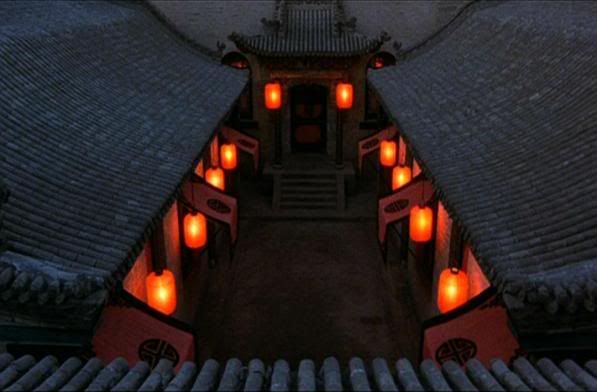
The prevalence of red also works on another level, foreshadowing the inflamed passions that take centre stage later in the film.
Lantern is, perhaps above all else, a brilliant melodrama rooted in the vindictive hearts of its central characters. The film plays out like an intricate web of power battles: Songlian vs. the other wives, Songlian vs. the Master, Meishan vs. Zhuoyan, Yan’er vs. Songlian etc. These people exist in an enclosed world dominated by mind-games that reach unrivalled heights of spitefulness. Initially, one can’t help but react with glee at some of the bitchiness that takes place – not to mention the wicked irony of each wife continually referring to the other as “sister” – but as the action progresses it becomes apparent that the women are toying with one anothers’
lives and the intrigues resultantly take on a far more threatening dimension. Yimou’s great achievement derives from his ability to utilise these already gripping dilemmas as a platform for a wider and more scathing commentary on various facets of the Chinese experience.
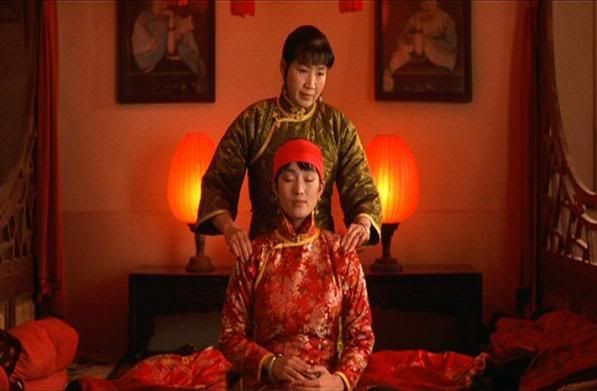
Women are at the heart of this film and accordingly it’s their plight that the director is primarily concerned with. Although they’re privileged to an extent,
Lantern deftly shows us that wealth by no means equates to freedom – as previously stated, their opulent surroundings actually serve to entrap and even destroy them. Female roles are confined to the sexual spheres of their bedrooms where they are expected to satisfy their Master and provide
male heirs to maintain the patriarchal lineage, or alternatively they’re limited to a domestic sphere that requires complete subservience. The vapidity of such expectations is incongruously validated by the male guardians of this realm, with the housekeeper telling Songlian: “The Chen family’s customs go back many generations. It is important that you obey them.” Clearly, an all-pervasive faith in the integrity of tradition is what motivates this code of conduct. How ironic then, that those very traditions should breed the friction that disrupts the fragile unity of the household. The repeated use of one specific ritual demonstrates this to agonizing effect: every evening, custom dictates that the four wives stand outside their gateways to anticipate whether or not the Master will spend the night with them. His decision is marked by the placing of a red lantern outside the chosen wife’s house, thereby divulging the titular object’s status as a power symbol alongside the aforementioned sexual intimations. The entire process serves only to degrade all concerned: the unsuccessful wives face humiliation whilst the ‘victor’ in the power struggle is forced to contend with the underlying resentment of her fellow concubines. This scenario is especially pitiful when one considers the chosen wife’s scant rewards: a foot massage, the ability to set the next day’s menu, and another chance at producing an all-important male heir. The fact that all of these women consider such meagre scraps worth fighting for speaks volumes about the extent to which their silent repression has permeated their mindsets.
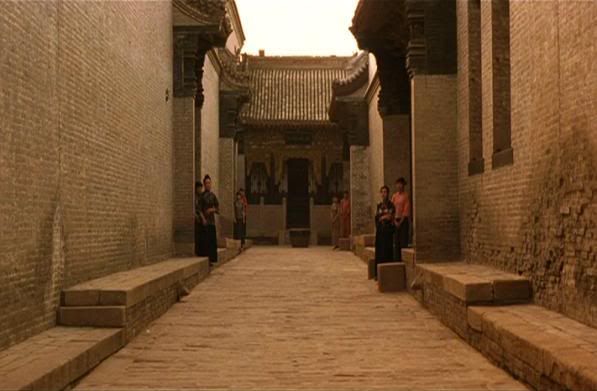
That Songlian, an educated woman confident enough to frequently exert her authority over the Master, should resort to engaging in these games is disheartening – although only on a surface level. The character as Gong Li so magnificently plays her is obstinate, petty and as caustic as her rivals: in short, she’s far from the most likeable of heroines. Regardless, if one considers her hostile new environment and, perhaps more importantly her youth (the girl is only
nineteen, after all) it’s possible to develop a basic understanding of the motivation behind her dubious actions. Certainly, her age and her education combine to beset the film with a lingering sense of squandered potential. Moreover, should we dare to see Songlian’s predicament as a figurative representation of the fate of Chinese women as a whole (in the film’s early 20th-century setting, if not the present day), then this wilful loss of female promise is lent much greater relevance. Bearing this in mind, certain other aspects of Yimou’s portrayal warrant further analysis: for example, what of the film’s ignorance towards the forces that led to Songlian’s degradation? Yimou shows us the downfall but, minor allusions aside, keeps us unaware of the background and thereby hints at its irrelevance in a domain where female oppression is simply another fact of life. Another important feature is the ‘reward’ of the foot massage which evokes an inevitable comparison with the more controversial act of foot
binding. My knowledge of the procedure is somewhat limited, but it’s clear that Yimou’s
use of the act is fundamental, for although the two practices seem polar opposites on paper the massage assumes the same problematic implications of its predecessor: binding has, rightly or wrongly, often been viewed as an instrument of patriarchal enslavement and this is reiterated in the film through the massage which is awarded to the wives solely for them to “better serve their man.” In other words, Yimou astoundingly parlays the intellectual negativity associated with the
pain of foot binding into the deceptive
comfort of the foot massage. Nonetheless, he also draws from the alternate viewpoint: binding has conversely been seen as a desirable yardstick for women due to its functioning as a status symbol and, of course, the massage in
Lantern performs exactly the same role by affording one wife privilege over the others. It’s emblematic of the film’s trademark complexity that an event so seemingly insignificant could penetrate such depths of meaning.
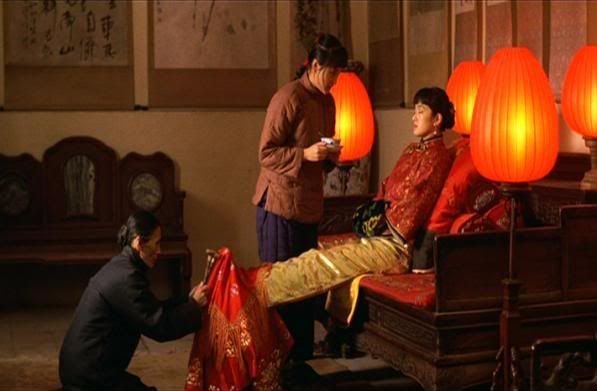
Yimou’s directorial decisions, and their ability to illuminate his story, surely reach a daring peak with his refusal to grant us an unobstructed view of his film’s most powerful character. The ‘Master’ is central to the narrative, yet Yimou hides him behind painted veils, obscures him through long-shots and even denigrates him to the rank of a mere off-screen voice. The Master’s literal role in the film forms a stark contrast to his metaphorical role as the patriarchal head – and perhaps this is the point that Yimou is trying to make: the Master’s authority is omnipotent to the point where his presence is no longer necessary to enforce his will. He presides over a system where gender roles are strictly defined, as is class status – one recalls how the servant Yan’er is used as sexual fulfilment but is admonished for aspiring to be a mistress. The third wife Meishan’s affair with the doctor both threatens the Master’s sexual supremacy (extra-marital relations are reserved to the male realm) but more importantly it deviates from the prescribed norms, and is subsequently punished with brutal force. This incident in particular, and the categorical denials of Meishan’s fate that follow, induce memories of similar acts of brutality that have been quietly whitewashed by authorities in modern Chinese history. Little wonder then, that the film was banned upon release in Yimou’s homeland.
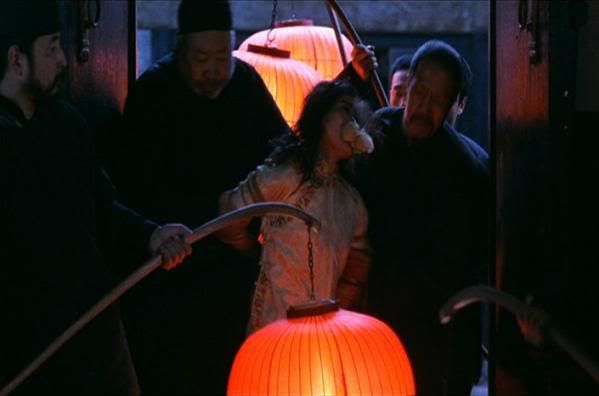 Raise the Red Lantern
Raise the Red Lantern is as visually striking as it is intellectually invigorating, but one couldn’t truly
love it unless it struck an emotional chord – and that it does, to haunting effect. Whilst the film brilliantly critiques the oppressor, it also finds fault in the oppressed as it’s the lack of empathy between the characters that affects us the most. The general inability to forge human connections of substance is almost countered by the mutual understanding between Songlian and Meishan – but Yimou repudiates even this faint glimmer of hope, by holding the former responsible for the latter’s tragic end. It’s as if the mechanical hand of the patriarchy not only subjugates the women, but additionally erodes their humanity thus rendering them incapable of uniting against it. It’s this lack of compassion in
Lantern’s enclosed world that makes for such riveting yet painful viewing, and one can’t help but wonder: could Songlian’s descent into insanity be a
refuge from all the madness of reality? The way in which the latter is presented suggests that such an idea may not be totally implausible, and surely that’s the most devastating indictment of all?
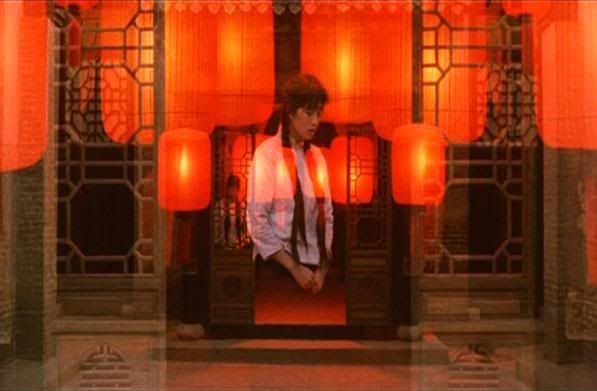
 Raise the Red Lantern is surely one of the finest films of its decade? It’s visually spellbinding, as expected, but unlike Yimou’s recent efforts Lantern’s style is less to do with our being blitzed with special effects and more to do with the director’s ability to exploit his setting’s potential to the max. Almost the entire film takes place in a palatial complex of enormous proportions. When we first arrive here along with our protagonist, Songlian, it’s difficult not to be overawed by the extravagance of a residence that apparently branches out in all directions. Nevertheless, it’s the banality of this sparsely-inhabited space that emerges as it’s most resounding feature, and the narrative’s direction ensures that what first seems magnificent later morphs into little more than a stifling human compound. The greys and browns that dominate the palette of Yimou’s exteriors contribute to this nullifying effect, forming a brazen contrast to the copious use of reds that paint internal space. That colour’s primary connotation here is a sexual one: the lighting of the red lantern indicates that the Master will spend the night, and the bathing of each wife’s apartment in the colour places further emphasis on the fact that these women’s rooms (and their roles) are conceived as purely eroticised areas.
Raise the Red Lantern is surely one of the finest films of its decade? It’s visually spellbinding, as expected, but unlike Yimou’s recent efforts Lantern’s style is less to do with our being blitzed with special effects and more to do with the director’s ability to exploit his setting’s potential to the max. Almost the entire film takes place in a palatial complex of enormous proportions. When we first arrive here along with our protagonist, Songlian, it’s difficult not to be overawed by the extravagance of a residence that apparently branches out in all directions. Nevertheless, it’s the banality of this sparsely-inhabited space that emerges as it’s most resounding feature, and the narrative’s direction ensures that what first seems magnificent later morphs into little more than a stifling human compound. The greys and browns that dominate the palette of Yimou’s exteriors contribute to this nullifying effect, forming a brazen contrast to the copious use of reds that paint internal space. That colour’s primary connotation here is a sexual one: the lighting of the red lantern indicates that the Master will spend the night, and the bathing of each wife’s apartment in the colour places further emphasis on the fact that these women’s rooms (and their roles) are conceived as purely eroticised areas. The prevalence of red also works on another level, foreshadowing the inflamed passions that take centre stage later in the film. Lantern is, perhaps above all else, a brilliant melodrama rooted in the vindictive hearts of its central characters. The film plays out like an intricate web of power battles: Songlian vs. the other wives, Songlian vs. the Master, Meishan vs. Zhuoyan, Yan’er vs. Songlian etc. These people exist in an enclosed world dominated by mind-games that reach unrivalled heights of spitefulness. Initially, one can’t help but react with glee at some of the bitchiness that takes place – not to mention the wicked irony of each wife continually referring to the other as “sister” – but as the action progresses it becomes apparent that the women are toying with one anothers’ lives and the intrigues resultantly take on a far more threatening dimension. Yimou’s great achievement derives from his ability to utilise these already gripping dilemmas as a platform for a wider and more scathing commentary on various facets of the Chinese experience.
The prevalence of red also works on another level, foreshadowing the inflamed passions that take centre stage later in the film. Lantern is, perhaps above all else, a brilliant melodrama rooted in the vindictive hearts of its central characters. The film plays out like an intricate web of power battles: Songlian vs. the other wives, Songlian vs. the Master, Meishan vs. Zhuoyan, Yan’er vs. Songlian etc. These people exist in an enclosed world dominated by mind-games that reach unrivalled heights of spitefulness. Initially, one can’t help but react with glee at some of the bitchiness that takes place – not to mention the wicked irony of each wife continually referring to the other as “sister” – but as the action progresses it becomes apparent that the women are toying with one anothers’ lives and the intrigues resultantly take on a far more threatening dimension. Yimou’s great achievement derives from his ability to utilise these already gripping dilemmas as a platform for a wider and more scathing commentary on various facets of the Chinese experience. Women are at the heart of this film and accordingly it’s their plight that the director is primarily concerned with. Although they’re privileged to an extent, Lantern deftly shows us that wealth by no means equates to freedom – as previously stated, their opulent surroundings actually serve to entrap and even destroy them. Female roles are confined to the sexual spheres of their bedrooms where they are expected to satisfy their Master and provide male heirs to maintain the patriarchal lineage, or alternatively they’re limited to a domestic sphere that requires complete subservience. The vapidity of such expectations is incongruously validated by the male guardians of this realm, with the housekeeper telling Songlian: “The Chen family’s customs go back many generations. It is important that you obey them.” Clearly, an all-pervasive faith in the integrity of tradition is what motivates this code of conduct. How ironic then, that those very traditions should breed the friction that disrupts the fragile unity of the household. The repeated use of one specific ritual demonstrates this to agonizing effect: every evening, custom dictates that the four wives stand outside their gateways to anticipate whether or not the Master will spend the night with them. His decision is marked by the placing of a red lantern outside the chosen wife’s house, thereby divulging the titular object’s status as a power symbol alongside the aforementioned sexual intimations. The entire process serves only to degrade all concerned: the unsuccessful wives face humiliation whilst the ‘victor’ in the power struggle is forced to contend with the underlying resentment of her fellow concubines. This scenario is especially pitiful when one considers the chosen wife’s scant rewards: a foot massage, the ability to set the next day’s menu, and another chance at producing an all-important male heir. The fact that all of these women consider such meagre scraps worth fighting for speaks volumes about the extent to which their silent repression has permeated their mindsets.
Women are at the heart of this film and accordingly it’s their plight that the director is primarily concerned with. Although they’re privileged to an extent, Lantern deftly shows us that wealth by no means equates to freedom – as previously stated, their opulent surroundings actually serve to entrap and even destroy them. Female roles are confined to the sexual spheres of their bedrooms where they are expected to satisfy their Master and provide male heirs to maintain the patriarchal lineage, or alternatively they’re limited to a domestic sphere that requires complete subservience. The vapidity of such expectations is incongruously validated by the male guardians of this realm, with the housekeeper telling Songlian: “The Chen family’s customs go back many generations. It is important that you obey them.” Clearly, an all-pervasive faith in the integrity of tradition is what motivates this code of conduct. How ironic then, that those very traditions should breed the friction that disrupts the fragile unity of the household. The repeated use of one specific ritual demonstrates this to agonizing effect: every evening, custom dictates that the four wives stand outside their gateways to anticipate whether or not the Master will spend the night with them. His decision is marked by the placing of a red lantern outside the chosen wife’s house, thereby divulging the titular object’s status as a power symbol alongside the aforementioned sexual intimations. The entire process serves only to degrade all concerned: the unsuccessful wives face humiliation whilst the ‘victor’ in the power struggle is forced to contend with the underlying resentment of her fellow concubines. This scenario is especially pitiful when one considers the chosen wife’s scant rewards: a foot massage, the ability to set the next day’s menu, and another chance at producing an all-important male heir. The fact that all of these women consider such meagre scraps worth fighting for speaks volumes about the extent to which their silent repression has permeated their mindsets. That Songlian, an educated woman confident enough to frequently exert her authority over the Master, should resort to engaging in these games is disheartening – although only on a surface level. The character as Gong Li so magnificently plays her is obstinate, petty and as caustic as her rivals: in short, she’s far from the most likeable of heroines. Regardless, if one considers her hostile new environment and, perhaps more importantly her youth (the girl is only nineteen, after all) it’s possible to develop a basic understanding of the motivation behind her dubious actions. Certainly, her age and her education combine to beset the film with a lingering sense of squandered potential. Moreover, should we dare to see Songlian’s predicament as a figurative representation of the fate of Chinese women as a whole (in the film’s early 20th-century setting, if not the present day), then this wilful loss of female promise is lent much greater relevance. Bearing this in mind, certain other aspects of Yimou’s portrayal warrant further analysis: for example, what of the film’s ignorance towards the forces that led to Songlian’s degradation? Yimou shows us the downfall but, minor allusions aside, keeps us unaware of the background and thereby hints at its irrelevance in a domain where female oppression is simply another fact of life. Another important feature is the ‘reward’ of the foot massage which evokes an inevitable comparison with the more controversial act of foot binding. My knowledge of the procedure is somewhat limited, but it’s clear that Yimou’s use of the act is fundamental, for although the two practices seem polar opposites on paper the massage assumes the same problematic implications of its predecessor: binding has, rightly or wrongly, often been viewed as an instrument of patriarchal enslavement and this is reiterated in the film through the massage which is awarded to the wives solely for them to “better serve their man.” In other words, Yimou astoundingly parlays the intellectual negativity associated with the pain of foot binding into the deceptive comfort of the foot massage. Nonetheless, he also draws from the alternate viewpoint: binding has conversely been seen as a desirable yardstick for women due to its functioning as a status symbol and, of course, the massage in Lantern performs exactly the same role by affording one wife privilege over the others. It’s emblematic of the film’s trademark complexity that an event so seemingly insignificant could penetrate such depths of meaning.
That Songlian, an educated woman confident enough to frequently exert her authority over the Master, should resort to engaging in these games is disheartening – although only on a surface level. The character as Gong Li so magnificently plays her is obstinate, petty and as caustic as her rivals: in short, she’s far from the most likeable of heroines. Regardless, if one considers her hostile new environment and, perhaps more importantly her youth (the girl is only nineteen, after all) it’s possible to develop a basic understanding of the motivation behind her dubious actions. Certainly, her age and her education combine to beset the film with a lingering sense of squandered potential. Moreover, should we dare to see Songlian’s predicament as a figurative representation of the fate of Chinese women as a whole (in the film’s early 20th-century setting, if not the present day), then this wilful loss of female promise is lent much greater relevance. Bearing this in mind, certain other aspects of Yimou’s portrayal warrant further analysis: for example, what of the film’s ignorance towards the forces that led to Songlian’s degradation? Yimou shows us the downfall but, minor allusions aside, keeps us unaware of the background and thereby hints at its irrelevance in a domain where female oppression is simply another fact of life. Another important feature is the ‘reward’ of the foot massage which evokes an inevitable comparison with the more controversial act of foot binding. My knowledge of the procedure is somewhat limited, but it’s clear that Yimou’s use of the act is fundamental, for although the two practices seem polar opposites on paper the massage assumes the same problematic implications of its predecessor: binding has, rightly or wrongly, often been viewed as an instrument of patriarchal enslavement and this is reiterated in the film through the massage which is awarded to the wives solely for them to “better serve their man.” In other words, Yimou astoundingly parlays the intellectual negativity associated with the pain of foot binding into the deceptive comfort of the foot massage. Nonetheless, he also draws from the alternate viewpoint: binding has conversely been seen as a desirable yardstick for women due to its functioning as a status symbol and, of course, the massage in Lantern performs exactly the same role by affording one wife privilege over the others. It’s emblematic of the film’s trademark complexity that an event so seemingly insignificant could penetrate such depths of meaning. Yimou’s directorial decisions, and their ability to illuminate his story, surely reach a daring peak with his refusal to grant us an unobstructed view of his film’s most powerful character. The ‘Master’ is central to the narrative, yet Yimou hides him behind painted veils, obscures him through long-shots and even denigrates him to the rank of a mere off-screen voice. The Master’s literal role in the film forms a stark contrast to his metaphorical role as the patriarchal head – and perhaps this is the point that Yimou is trying to make: the Master’s authority is omnipotent to the point where his presence is no longer necessary to enforce his will. He presides over a system where gender roles are strictly defined, as is class status – one recalls how the servant Yan’er is used as sexual fulfilment but is admonished for aspiring to be a mistress. The third wife Meishan’s affair with the doctor both threatens the Master’s sexual supremacy (extra-marital relations are reserved to the male realm) but more importantly it deviates from the prescribed norms, and is subsequently punished with brutal force. This incident in particular, and the categorical denials of Meishan’s fate that follow, induce memories of similar acts of brutality that have been quietly whitewashed by authorities in modern Chinese history. Little wonder then, that the film was banned upon release in Yimou’s homeland.
Yimou’s directorial decisions, and their ability to illuminate his story, surely reach a daring peak with his refusal to grant us an unobstructed view of his film’s most powerful character. The ‘Master’ is central to the narrative, yet Yimou hides him behind painted veils, obscures him through long-shots and even denigrates him to the rank of a mere off-screen voice. The Master’s literal role in the film forms a stark contrast to his metaphorical role as the patriarchal head – and perhaps this is the point that Yimou is trying to make: the Master’s authority is omnipotent to the point where his presence is no longer necessary to enforce his will. He presides over a system where gender roles are strictly defined, as is class status – one recalls how the servant Yan’er is used as sexual fulfilment but is admonished for aspiring to be a mistress. The third wife Meishan’s affair with the doctor both threatens the Master’s sexual supremacy (extra-marital relations are reserved to the male realm) but more importantly it deviates from the prescribed norms, and is subsequently punished with brutal force. This incident in particular, and the categorical denials of Meishan’s fate that follow, induce memories of similar acts of brutality that have been quietly whitewashed by authorities in modern Chinese history. Little wonder then, that the film was banned upon release in Yimou’s homeland. Raise the Red Lantern is as visually striking as it is intellectually invigorating, but one couldn’t truly love it unless it struck an emotional chord – and that it does, to haunting effect. Whilst the film brilliantly critiques the oppressor, it also finds fault in the oppressed as it’s the lack of empathy between the characters that affects us the most. The general inability to forge human connections of substance is almost countered by the mutual understanding between Songlian and Meishan – but Yimou repudiates even this faint glimmer of hope, by holding the former responsible for the latter’s tragic end. It’s as if the mechanical hand of the patriarchy not only subjugates the women, but additionally erodes their humanity thus rendering them incapable of uniting against it. It’s this lack of compassion in Lantern’s enclosed world that makes for such riveting yet painful viewing, and one can’t help but wonder: could Songlian’s descent into insanity be a refuge from all the madness of reality? The way in which the latter is presented suggests that such an idea may not be totally implausible, and surely that’s the most devastating indictment of all?
Raise the Red Lantern is as visually striking as it is intellectually invigorating, but one couldn’t truly love it unless it struck an emotional chord – and that it does, to haunting effect. Whilst the film brilliantly critiques the oppressor, it also finds fault in the oppressed as it’s the lack of empathy between the characters that affects us the most. The general inability to forge human connections of substance is almost countered by the mutual understanding between Songlian and Meishan – but Yimou repudiates even this faint glimmer of hope, by holding the former responsible for the latter’s tragic end. It’s as if the mechanical hand of the patriarchy not only subjugates the women, but additionally erodes their humanity thus rendering them incapable of uniting against it. It’s this lack of compassion in Lantern’s enclosed world that makes for such riveting yet painful viewing, and one can’t help but wonder: could Songlian’s descent into insanity be a refuge from all the madness of reality? The way in which the latter is presented suggests that such an idea may not be totally implausible, and surely that’s the most devastating indictment of all?
No comments:
Post a Comment